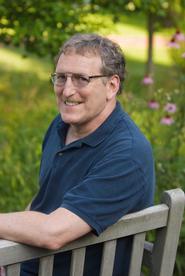
On the eve of the 40th anniversary of Woodstock, Maurice Isserman, the James L. Ferguson Professor of History and Woodstock attendee, was interviewed by Minnesota Public Radio with Woodstock performer Richie Havens and longtime New York disc jockey Pete Fornatale. The hour-long public Minnesota Public Radio interview on Monday, Aug. 10, was a reflection on the music and the meaning of Woodstock. Isserman discussed the impact of various performances on the crowd as he observed and experienced them. He summarized Woodstock as “an image, a parable for a greater American experience.”
On the same day, The Chronicle of Higher Education published Isserman’s essay, “3 Days of Peace and Music, 40 Years of Memory.” In explaining the almost mythic status that Woodstock has achieved, Isserman wrote “The fact that the organizers were making it up as they went along only added to the appeal. Improvisation and serendipity were the keys to Woodstock’s success.”
Remembering his own experiences as a teenage participant, he wrote, “From the moment I crested the hill above the stage and looked down on the multitudes gathered below, I had a sense of having unexpectedly blundered into the opportunity to Make History – a bracing feeling that I’ve seldom felt thereafter, and one that went a long way to compensate for the fact that during the next 24 hours I spent perched on a soggy blanket on a muddy hillside, I would neither eat nor sleep.”
Isserman also reviewed the media’s descriptions of Woodstock, noting The New York Times reversal one day to the next as illustrated in its commentaries: “Nightmare in the Catskills” followed by “Morning after at Bethel” in which the event was described as “essentially a phenomenon of innocence.”
In analyzing its significance, Isserman wrote, “Woodstock was not a protest, and many of those attending never had attended, and never would, a political demonstration. … But without the political insurgencies that preceded it, without the vision of the possibility of change and self-definition that began with the civil-rights movement and was taken up by more and more Americans (students, women, and, earlier in that summer of 1969, gay people), Woodstock would never have happened.” In conclusion Isserman suggested, “Maybe on this 40th anniversary, at a moment when the country faces challenges and decisions every bit as important – and divisive – as in 1969, we can remember Woodstock as a more complicated, less “innocent” phenomenon.”
On the same day, The Chronicle of Higher Education published Isserman’s essay, “3 Days of Peace and Music, 40 Years of Memory.” In explaining the almost mythic status that Woodstock has achieved, Isserman wrote “The fact that the organizers were making it up as they went along only added to the appeal. Improvisation and serendipity were the keys to Woodstock’s success.”
Remembering his own experiences as a teenage participant, he wrote, “From the moment I crested the hill above the stage and looked down on the multitudes gathered below, I had a sense of having unexpectedly blundered into the opportunity to Make History – a bracing feeling that I’ve seldom felt thereafter, and one that went a long way to compensate for the fact that during the next 24 hours I spent perched on a soggy blanket on a muddy hillside, I would neither eat nor sleep.”
Isserman also reviewed the media’s descriptions of Woodstock, noting The New York Times reversal one day to the next as illustrated in its commentaries: “Nightmare in the Catskills” followed by “Morning after at Bethel” in which the event was described as “essentially a phenomenon of innocence.”
In analyzing its significance, Isserman wrote, “Woodstock was not a protest, and many of those attending never had attended, and never would, a political demonstration. … But without the political insurgencies that preceded it, without the vision of the possibility of change and self-definition that began with the civil-rights movement and was taken up by more and more Americans (students, women, and, earlier in that summer of 1969, gay people), Woodstock would never have happened.” In conclusion Isserman suggested, “Maybe on this 40th anniversary, at a moment when the country faces challenges and decisions every bit as important – and divisive – as in 1969, we can remember Woodstock as a more complicated, less “innocent” phenomenon.”
Posted August 10, 2009
